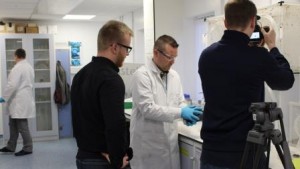HEFCE and Research Councils UK have published a review of the interdisciplinary research landscape in the UK, supported by a report examining 10 institutional case studies in English universities.
 The studies complement work recently published by the British Academy, the Global Research Council and HEFCE with the Medical Research Council.
The studies complement work recently published by the British Academy, the Global Research Council and HEFCE with the Medical Research Council.
The reports will form part of the discussion at the conference: ‘Interdisciplinarity: Policy and Practice’ on Thursday 8 December 2016, co-hosted by HEFCE, the British Academy and Research Councils UK.
The reports provide an overview of the current interdisciplinary research landscape in the UK, drawing on a survey of over 2,000 participants, workshops, interviews and case studies.
The findings reflect researcher, strategic leader and funder perspectives, highlighting interdisciplinary research (IDR) as a crucial part of the UK research landscape.
A desire to achieve broader impact, the challenges associated with peer review and evaluation, the importance of institutional support and the value of flexible funds featured as common themes.
The case studies identified good practice in a range of institutions seeking to grow, sustain and embed interdisciplinary practice in their research cultures.
The importance of balancing top-down and bottom-up approaches, the role of flexible funding, and institutional infrastructure that prioritises high-quality research were identified as some potentially beneficial features in successful institutional IDR environments.
The reports also highlighted that:
- Submitted outputs declared as interdisciplinary did as well as single discipline outputs in the 2014 Research Excellence Framework (REF). This is despite the structure of the REF being perceived as a barrier by some researchers.
- The measurement of impact in research assessment is seen by some as a showcase for interdisciplinary activity that has helped IDR to gain traction in universities.
- Universities can and do use many models to support IDR. What works is contextual, but there are lessons to be learned from existing good practice.
- IDR often requires more time for initial teams to develop and for projects to result in outcomes.
The evaluation of interdisciplinary research outputs, and their impact, were highlighted by Lord Stern’s Independent Review of the Research Excellence Framework as areas for further development.
Subject to the views of our respective Ministers, the UK higher education funding bodies intend to take this forward in a consultation, to be launched before the end of 2016.
Read the reports
 Congratulations to BU’s Equality and Diversity Adviser James Palfreman-Kay whose application to HEFCE’s ‘Catalyst Fund: Tackling hate crime and online harassment on campus‘ has been successful. He is one of 40 academic recipients of funding at universities and colleges throughout England. Applications have been assessed by a panel of HEFCE staff and external experts from across relevant areas of knowledge particular to student safeguarding.
Congratulations to BU’s Equality and Diversity Adviser James Palfreman-Kay whose application to HEFCE’s ‘Catalyst Fund: Tackling hate crime and online harassment on campus‘ has been successful. He is one of 40 academic recipients of funding at universities and colleges throughout England. Applications have been assessed by a panel of HEFCE staff and external experts from across relevant areas of knowledge particular to student safeguarding. The deadline is fast approaching for the HEIF-6 funding call – 23rd July.
The deadline is fast approaching for the HEIF-6 funding call – 23rd July. My name is Oliver Cooke and I am currently in my third year of study on the BA Honours Media Production course. As part of my Graduate Project, I am developing a media package in order to showcase a number of projects that have been awarded
My name is Oliver Cooke and I am currently in my third year of study on the BA Honours Media Production course. As part of my Graduate Project, I am developing a media package in order to showcase a number of projects that have been awarded  It hardly feels like the dust has settled on the results from the last Research Excellence Framework, yet here we are again – almost half way through another research assessment cycle with HEFCE proposing potential changes to the next exercise. It feels like I’ve been transported back to 2009 when HEFCE were running
It hardly feels like the dust has settled on the results from the last Research Excellence Framework, yet here we are again – almost half way through another research assessment cycle with HEFCE proposing potential changes to the next exercise. It feels like I’ve been transported back to 2009 when HEFCE were running 




 The studies complement work recently published by
The studies complement work recently published by 
















 Dr. Ashraf cited on ‘Modest Fashion’ in The Guardian
Dr. Ashraf cited on ‘Modest Fashion’ in The Guardian NIHR-funded research launches website
NIHR-funded research launches website Academics write for newspaper in Nepal
Academics write for newspaper in Nepal New paper published on disability in women & girls
New paper published on disability in women & girls Global Consortium for Public Health Research 2025
Global Consortium for Public Health Research 2025 MSCA Postdoctoral Fellowships 2025 Call
MSCA Postdoctoral Fellowships 2025 Call ERC Advanced Grant 2025 Webinar
ERC Advanced Grant 2025 Webinar Horizon Europe Work Programme 2025 Published
Horizon Europe Work Programme 2025 Published Horizon Europe 2025 Work Programme pre-Published
Horizon Europe 2025 Work Programme pre-Published Update on UKRO services
Update on UKRO services European research project exploring use of ‘virtual twins’ to better manage metabolic associated fatty liver disease
European research project exploring use of ‘virtual twins’ to better manage metabolic associated fatty liver disease